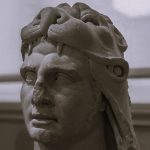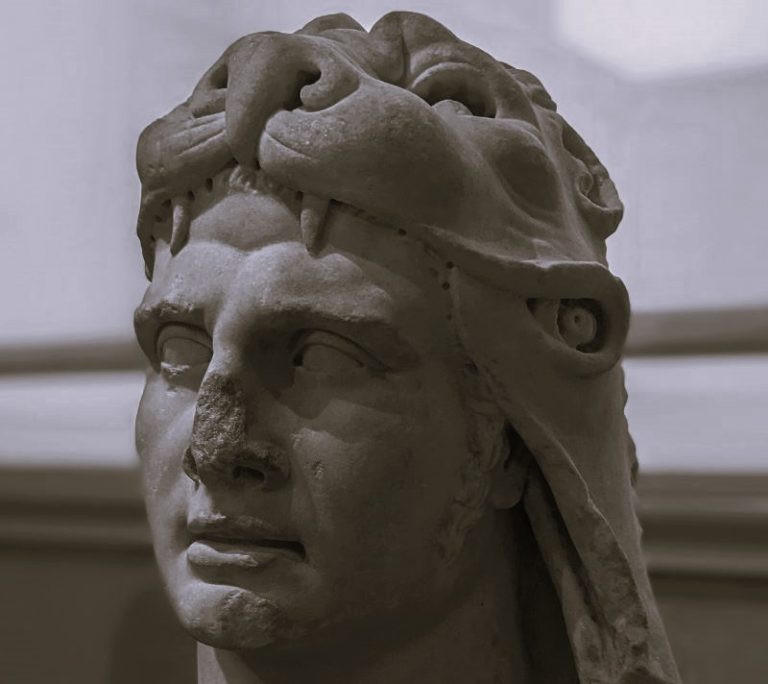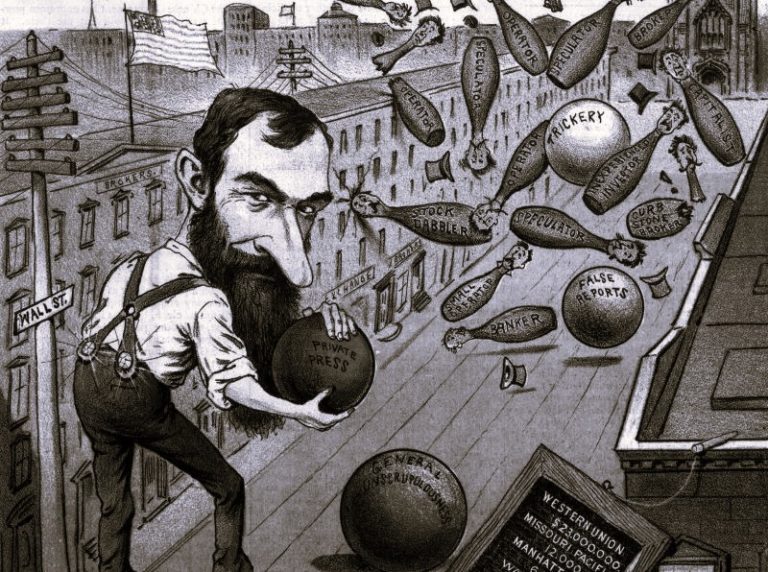


By William Henry Chamberlin
Historian and Journalist
Introduction
Overview
The greatest collapse of a mighty state, a large human society and a fruitful civilization of which we possess a reasonably accurate record, has been immortalized by Edward Gibbon’s historical classic, The Decline and Fall of The Roman Empire. Henry Adams remarked that Gibbon did not really explain the fall; but this criticism is not altogether just. As the following excerpts from The Decline and Fall show, the philosophic historian offered a number of reflections on the symptoms and causes of the drama which he set out to describe:
“This long peace and the uniform government of the Romans introduced a slow and secret poison into the vitals of the empire. The minds of men were gradually reduced to the same level, the fire of genius was extinguished, and even the military spirit evaporated…. They received laws and governors from the will of their sovereign and trusted for their defense to a mercenary army….
“The rougher trade of arms was abandoned to the peasants and barbarians of the frontiers, who knew no country but their camp, no science but that of war, no civil laws, and scarcely those of military discipline. With bloody hands, savage manners, and desperate resolutions, they sometimes guarded, but much oftener subverted the throne of the emperors.”
The Form Remains
Commenting on huge public spectacles which were instituted by the Emperor Philip (244-249 A.D.) Gibbon observes:
“To the undiscerning eye of the vulgar, Philip appeared a monarch no less powerful than Hadrian or Augustus had formerly been. The form was still the same, but the animating health and vigor were fled. The industry of the people was discouraged and exhausted by a long series of oppression.” (Italics supplied.)
And, describing a later phase of the decline, the reign of Diocletian (284-305 A.D.), Gibbon spells out this reference to oppression as the product of twin evils which always go together: a swollen bureaucracy and excessive taxation. To quote his account:
“The number of ministers, of magistrates, of officers, and of servants, who filled the different departments of the state, was multiplied beyond the example of former times; and (if we may borrow the warm expression of a contemporary) ‘when the proportion of those who received exceeded the proportion of those who contributed the provinces were oppressed by the weight of tributes.’ From this period to the extinction of the empire it would be easy to deduce an uninterrupted series of clamors and complaints. According to his religion and situation, each writer chooses either Diocletian or Constantine or Valens or Theodosius, for the object of his invectives; but they unanimously agree in representing the burden of the public impositions, and particularly the land-tax and capitation, as the intolerable and increasing grievance of their own times.”
The same effect of the same taxation system in the sixth-century Byzantine Empire, under the rule of Justinian, is described as follows by another historian (George Finley, Greece under the Romans, pp. 221, 222):
“At last the whole wealth of the empire was drawn into the imperial treasury; fruit trees were cut down and free men were sold to pay taxes; vineyards were rooted out, and buildings were destroyed to escape taxation….
“The increase of the public burdens at last proceeded so far that every year brought with it a failure in the taxes of some province, and consequently the confiscation of the private property of the wealthiest citizens of the insolvent district, until at last all the rich proprietors were ruined and the law became nugatory.”
Process of Degeneration
The pattern of Roman history is one of rise from a small pastoral community to build-up of a vast Mediterranean empire during centuries when there was a balance of ordered freedom, when the republican administration was simple and frugal, in contrast to the luxurious and corrupt despotisms which it overthrew, when patriotism was second nature to the Roman citizen, when the Romans did their own fighting and avoided the use of mercenaries. Then, after a summit of power had been reached, a process of degeneration set in.
Absolute imperial power replaced the complex check-and-balance system of the republic. The famous Senate declined from a vigorous state council, filled with civilian and military executives, into an ornamental rich men’s club. The Roman populace was no longer in a mood to fight for its constitutional liberties; it was lulled to sleep by the time-honored method: Panem et circenses. So long as it received free food at public expense, and elaborate games and spectacles, it ceased to concern itself with public affairs.
Private initiative disappeared; more and more the all-powerful imperial government was expected to look after everyone and attend to everything. This was beyond the power even of such a noble figure as the philosopher on the throne, Marcus Aurelius; and few Emperors approached Marcus Aurelius in virtue and wisdom. The Decline and Fall may be interpreted as a process of the atrophy of the individual creative faculty under the enervating influence of a state which went the inevitable way of unlimited power and became constantly more absolutist.
Three Centuries Later
The first Emperor, Augustus, was careful to maintain a show of preserving the old republican forms. Bit by bit despotism became more open in its outward manifestations; three centuries after Augustus, Diocletian, although himself a soldier who had risen from humble origin, introduced the whole ceremony of Oriental monarchy, including the use of the diadem, and required the most abject obeisance from all who approached him.
Incidentally, Diocletian may be remembered as a pioneer in wage and price fixing. The silver denarius, the standard Roman coin, had steadily declined in value during the barbarian incursions and the civil strife of the preceding century, and Diocletian decreed a devaluation of about 98 per cent. And in 301 A.D. he issued an edict which might have made him the patron saint of the OPA and all other agencies set up to substitute governmental fiat for the working of the free market.
Prices were set for all articles of daily use, and wages were fixed for all crafts and professions. The penalty for disobedience was banishment or death. Occupations were made hereditary; the son had to follow the father’s trade. But these attempts at regimentation did not succeed; the edict, after causing much harmful confusion, fell into abeyance and was no longer enforced. According to the Encyclopaedia Britannica, “Beginning with Diocletian local autonomy practically disappears, and Diocletian and his successors saved it [the Empire] at the price of practically destroying its economic and political life.”
The saving at such a price proved temporary and illusory. With the final breakdown in the fifth century the “grandeur that was Rome” had departed. The northern barbarians, who had already achieved a considerable infiltration as migrant settlers and mercenary soldiers, swarmed over the western provinces of the empire and set up their own kingdoms in what had formerly been Roman provinces.
The Fatal Symptoms
Overview
The Fall of Rome cannot be identified with any single battle or revolution. It was a slow process, extending to all fields of life, including literature and art; and it is intimately associated with the substitution of a centralized oppressive imperial bureaucracy for the former local autonomy and diversity, with its wider scope and opportunity for individual initiative and accomplishment.
Even in the period which Gibbon, perhaps a little rashly, designated as the most prosperous and happiest in human experience—the time of the so-called five Good Emperors (96-180 A.D.)—symptoms of the dry rot had set in. There was general peace, except for an occasional border campaign against the barbarians; and the Emperors ruled with justice and intelligence. But there were already symptoms of decay.
Taxation was mounting to a point where wealthy citizens of provincial municipalities were inclined to dodge the expensive honor of becoming chief magistrate and finding themselves obligated to provide feasts and games for the public benefit. When provincial cities, formerly free in matters of local administration, got into financial difficulties, the omni competent Imperial government proceeded to bail them out and appoint official directors of their affairs.
Subsidized Softness
A welfare state system taught the people of Rome and other big cities the ease of idleness. By the time of Marcus Aurelius there was a daily distribution of bread, pork, and oil to the populace. Expenses for gladiatorial combats and other public spectacles mounted until an estimated figure of $100 million a year was reached. The descendants of the sturdy original Romans showed more inclination to spend their days in the coliseum and less in serving their country. The army—necessary to guard the long frontiers against restless tribes of barbarians—had to be recruited more and more on a mercenary basis and became, as a result of this process, less disciplined and less reliable politically. At one time the office of Emperor was actually put up at auction by the Praetorian Guards who dominated the capital city of Rome. In the opinion of the Canadian classical scholar, W. G. Hardy, the divorce between the barbarized army and the civilized but soft civilians was the immediate cause of the collapse.
Professor Hardy mentions a plague, originating in the East, perhaps something like the Black Death of the Middle Ages, as a contributory cause of Rome’s decline; but adds significantly (The Greek and Roman World, pp. 103, 104):
“Even before the plague the Roman world was rotting from within. Government paternalism, bureaucracy, inflation, an ever-increasing taste for the brutal and brutalizing spectacles of the amphitheatre and the circus were symptoms of a spiritual malaise which had begun when political freedom was tossed away in the interests of peace, security, and materialism. There was the canker of slavery and the equally dangerous practice of keeping a segment of the population permanently on the dole. There was free labor subsisting on starvation wages because of the competition of slavery. At the other end of the scale lolled a group of multimillionaires for whom no luxury was too extravagant. Nor did anyone perceive that inflation and rising taxation must ultimately squeeze the middle class out of being.”
Easy Prey for Barbarians
Overview
The example of the fall of Rome is a severe blow to theorists who see historical development as an upward curve of continuous and inevitable progress. Many centuries of darkness, of confused strife and pitiful ignorance and poverty would pass before Roman standards of law, administration, and culture were regained, before figures of the stature of Cicero and Virgil and Horace and Juvenal and Tacitus would again appear in the countries of what had once been the Roman world, before new works of sculpture comparable with those of Greece and Rome would again be created. But Rome’s fall, as historians are more and more inclined to agree, came about not so much from any overwhelming pressure from without as from weaknesses and dry rot within, which finally made the decayed empire easy prey for the onrushing barbarians of the North.
Lessons for Our Time
Because of this, the process of decline and fall has real and urgent lessons for America and for the European nations which are heirs of Roman culture and civilization. One may be sure that the Founding Fathers of the American Republic, if they were alive today, would be quick to note with alarm certain parallels between American and later Roman developments, notably the willingness to sell out individual rights and freedom and local autonomy for a mess of centralized statist pottage.
For most of the Founding Fathers were among the most learned men of their time. The Federalist Papers and the preserved letters of Jefferson and John Adams, Franklin, and Madison are full of references to the events and developments of classical times and to the lessons which should be drawn from these happenings of the past. Perhaps the most impressive of these lessons is the fatal folly of letting all power become concentrated in a single state authority. The rule even of a “good” Emperor—a Nerva, a Trajan, a Marcus Aurelius—had an enervating, soporific effect, because it was not associated, for the citizen, with a lively sense of personal responsibility. It was what Alexis de Tocqueville had in mind in his remarkable prophetic forecast of what would be the end result of an advanced form of welfare state:
“Above this race of men stands an immense and tutelary power, which takes upon itself alone to secure their gratifications, and to watch over their fate. That power is absolute, minute, regular, provident, and mild. It would be like the authority of a parent, if, like that authority, its object was to prepare men for manhood; but it seeks, on the contrary, to keep them in perpetual childhood; it is well content that the people should rejoice, provided they think of nothing but rejoicing. For their happiness such a government willingly labors, but it chooses to be the sole agent and the only arbiter of that happiness; it provides for their security, foresees and supplies their necessities, facilitates their pleasures… what remains, but to spare them all the care of thinking and all the trouble of living?
“Such a power does not destroy, but it prevents existence; it does not tyrannize, but it compresses, enervates, extinguishes, and stupefies a people, till each nation is reduced to be nothing better than a flock of timid and industrious animals, of which the government is the shepherd.”
And, of course, there were few “good” Emperors. The history of the Roman Empire offered many vivid examples of how absolute power could corrupt absolutely.
Ever higher taxes, an ever-increasing bureaucracy, an evermore absolutist state power, a paralysis of local initiative, a growing reliance on a central authority that started with some aspects of a welfare state and ended in full-fledged totalitarianism, with such features as prescribing occupations and fixing wages and prices—such was the unhappy story of Rome’s Decline and Fall.
Does it take much exercise of the imagination to recognize in our own country and our own time some germs, at least, of the political, social, and economic diseases that first sapped and finally destroyed “the grandeur that was Rome “?
Published by the Foundation for Economic Education, originally published 01.01.1963, under the terms of a Creative Commons Attribution 4.0 International license.






